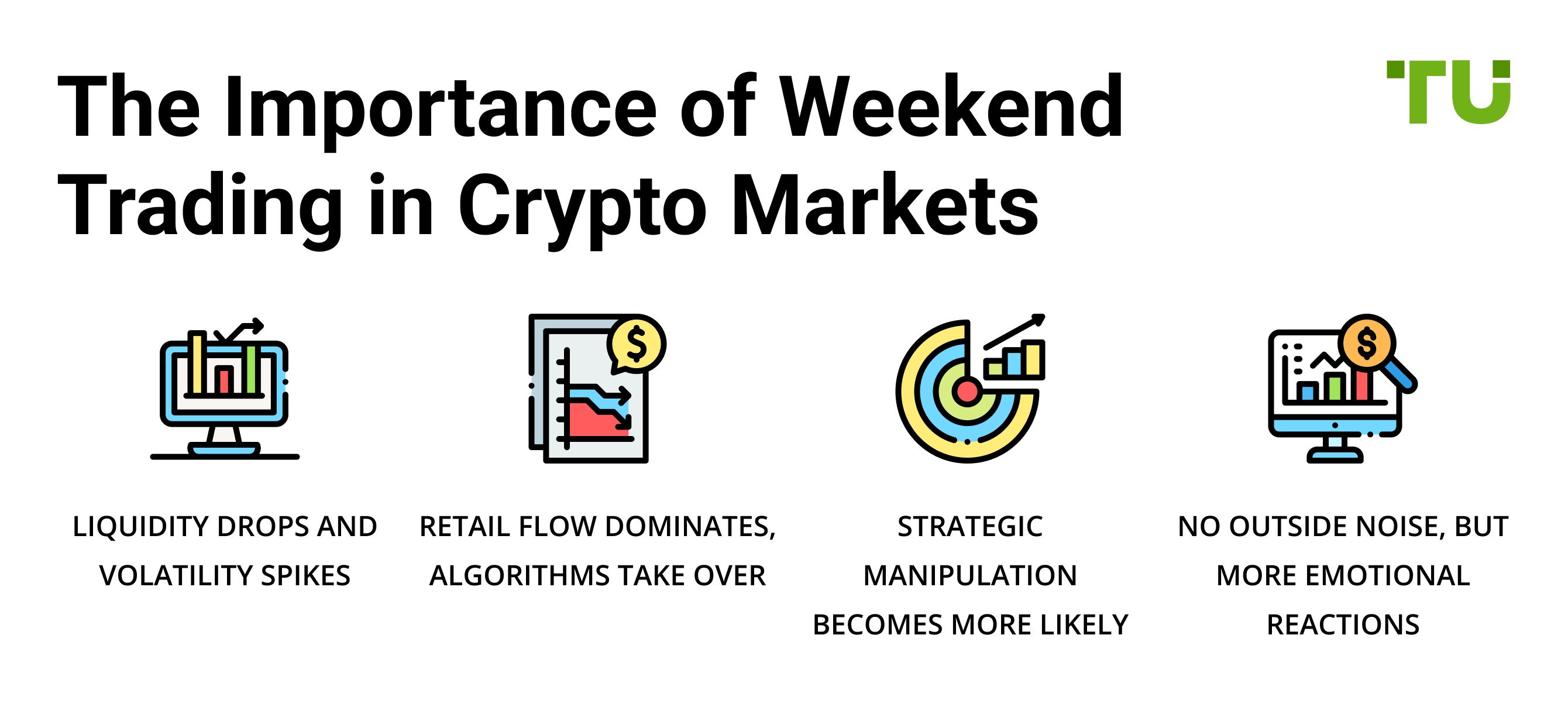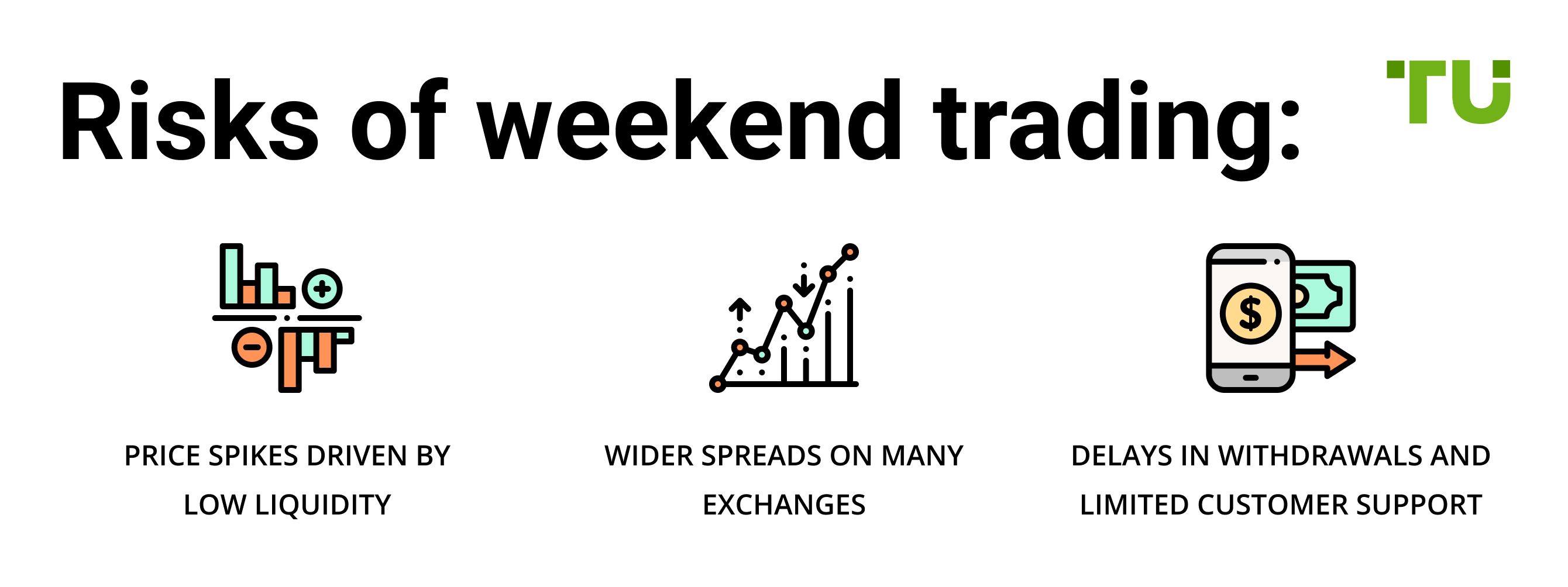Best Crypto For Weekend Trading



Editorial Note: While we adhere to strict Editorial Integrity, this post may contain references to products from our partners. Here's an explanation for How We Make Money. None of the data and information on this webpage constitutes investment advice according to our Disclaimer.
Best coins for weekend trading 2025:
Bitcoin (BTC) — high liquidity with $15B+ weekend volume and tight spreads.
Ethereum (ETH) — consistent demand from DeFi, DEX, and NFT activity.
Solana (SOL) — volatile price swings driven by network updates and momentum.
Dogecoin (DOGE) — reacts sharply to weekend social media buzz and memes.
XRP — sensitive to legal headlines, often released outside trading hours.
The cryptocurrency market operates around the clock, including weekends, offering unique opportunities for active traders. Unlike traditional financial markets, crypto trading doesn’t pause, which can lead to increased volatility during off-peak hours. This environment attracts those looking to capitalize on sudden price movements and market inefficiencies. In this article, we explore whether weekend trading is worth your attention, which cryptocurrencies show the most activity, and how to manage associated risks. You’ll also discover why certain coins perform better on weekends and what to consider when selecting assets. The guide is designed for both beginner and experienced crypto traders.
Risk warning: Cryptocurrency markets are highly volatile, with sharp price swings and regulatory uncertainties. Research indicates that 75-90% of traders face losses. Only invest discretionary funds and consult an experienced financial advisor.
Best coins for weekend trading in 2025
Different cryptocurrencies behave uniquely during weekends, and some offer more favorable conditions for short-term trading. In a low-liquidity environment, assets with consistent volume and strong responsiveness to external triggers become particularly relevant. The following cryptocurrencies have demonstrated sustained weekend activity and elevated volatility in 2025, making them suitable for active traders.
Bitcoin (BTC)
Bitcoin remains the most liquid asset in the crypto market, maintaining substantial trading volumes even on weekends. It continues to serve as a benchmark for market sentiment and a hedge during low-activity periods. According to CoinMarketCap, weekend volumes for BTC regularly exceed $15 billion, allowing for smooth execution and tighter spreads compared to most altcoins.
Ethereum (ETH)
Ethereum sees consistent weekend activity due to its role in powering DeFi protocols. Platforms like Uniswap, Aave, and OpenSea operate continuously, and each transaction requires ETH for gas fees. As noted by Binance Academy, this utility-driven demand keeps Ethereum liquid across time zones, with additional momentum from NFT trading and decentralized exchange (DEX) usage over the weekend.
Solana (SOL)
Solana is known for sharp weekend price swings, often linked to network status updates or community-driven momentum. These intraday fluctuations are attractive to traders seeking quick moves in high-speed environments. Data from CoinGecko shows that SOL ranks among the top assets in weekend volatility, with price movements frequently ranging from 8% to 10% within 24 hours.
Dogecoin (DOGE)
Dogecoin continues to be highly reactive to social media activity, especially over weekends when online engagement rises. Tweets, memes, or viral content can quickly impact DOGE’s price, creating short-term trade setups. As explained by Investopedia, its low entry price and meme appeal make it a frequent candidate for speculative weekend trades, particularly among retail investors.
XRP
XRP often reacts to legal and regulatory news, particularly updates related to the ongoing SEC vs. Ripple case. Weekend headlines — emerging outside of the traditional news cycle — can have an outsized impact on price movement. According to Cointelegraph, market reactions to legal updates tend to be more pronounced during off-market hours, giving traders opportunities to capitalize on fast shifts in sentiment.
These assets stand out for their sustained liquidity, frequent momentum shifts, and sensitivity to external catalysts. When selecting a cryptocurrency for weekend trading, it's useful to weigh both technical behavior and contextual signals such as news flow, platform usage, and retail trader engagement.
Why weekend trading matters in crypto

Cryptocurrency trading doesn’t sleep — and neither do its market forces. While the crypto market runs 24/7, weekends are far from business as usual. In fact, the dynamics of weekend trading are so distinct that they deserve specific attention from anyone serious about navigating this space with precision.
Liquidity drops and volatility spikes
Weekends usually see a pullback in trading volume as institutional desks and large funds reduce activity. With thinner liquidity comes wider spreads and sharper price moves. This opens up opportunities for scalpers and short-term traders but increases the risk for swing traders who don’t adjust their exposure. A price move that might be absorbed during the week can become a full-blown breakout or flash crash over the weekend.
Retail flow dominates, algorithms take over
Without the heavy flow of institutions, weekends are dominated by retail traders and algorithmic bots. These participants often rely on sentiment and momentum, not deep macro analysis. As a result, price movements can become exaggerated, and patterns tend to play out faster and more erratically. This makes it ideal for short-term setups — but deadly for anyone holding blindly without defined risk levels.
Strategic manipulation becomes more likely
The lower liquidity environment is a playground for whales. Large players can move markets more easily, setting off stop-loss runs, fakeouts, or sharp reversals that wouldn’t be possible during peak weekday hours. If you’re trading size, you must anticipate how these players might think and build traps — and protect your capital from getting caught in one.
No outside noise, but more emotional reactions
Weekends lack macroeconomic reports, equity market clues, or policy headlines. While that means fewer distractions, it also removes the “anchor” many traders use to guide direction. Without them, sentiment can turn quickly, driven by news on social media or sudden whale activity. If you’re a weekend trader, your edge comes from understanding order flow and behavioral triggers, not headlines.
Tips for weekend crypto trading
Weekend sessions in crypto trading differ from weekdays in terms of liquidity, market behavior, and volatility patterns. To navigate these conditions effectively, traders should adapt their strategies to account for structural nuances in weekend markets. Below are practical approaches designed to enhance trade execution and reduce exposure to avoidable risks.
Assess liquidity before entering a trade
Thin order books on weekends can lead to price slippage and delayed execution. Before opening a position, traders should review real-time liquidity data on their chosen exchange. This includes the bid-ask spread, order depth, and recent volume trends. Assets with low weekend trading volume are more likely to exhibit erratic price movements. Tools such as CoinMarketCap or CryptoCompare can provide liquidity insights across multiple trading pairs.
Use stop-loss and limit orders
Automated risk controls are essential during off-peak hours. Since weekend markets are more prone to volatility spikes, placing stop-losses and limit orders helps prevent unexpected losses or poor fills. Manual monitoring may not be sufficient, particularly when trading across time zones. According to Binance Academy, structured orders ensure that execution occurs only within acceptable price ranges and can protect traders from flash crashes.
Monitor news flow and social media
Sentiment shifts are amplified during weekends, as fewer institutional players are present to absorb sudden market reactions. Platforms like Twitter, Reddit, and Telegram become more influential, especially for meme coins and mid-cap assets. Real-time tracking of hashtags, influencer posts, and emerging news stories can provide early warning signals of upcoming volatility. Services like LunarCrush aggregate social sentiment data across multiple crypto assets, helping traders stay informed outside of traditional news cycles.
Avoid oversized positions in illiquid markets
Large trades can move prices significantly during low-volume periods. Weekend markets often lack the depth to handle high-value orders without affecting the spot price. Position sizing should be adjusted accordingly, taking into account recent volatility and slippage risk. Diversifying entries through scaled orders can also reduce impact. As noted by Kraken Learn, measured exposure improves trade resilience during unstable market hours.
These practices reflect the unique trading environment of weekends in the crypto space. Risk management, timing precision, and awareness of sentiment drivers are central to maintaining profitability in less predictable conditions.
Risks of weekend trading

Weekend crypto trading presents a distinct risk profile due to structural features of the market during non-business hours. While increased volatility can offer opportunities, it also introduces conditions that may impair execution, pricing, and operational continuity. Below are several weekend-specific risk factors that traders should account for before initiating positions.
Price spikes driven by low liquidity
Reduced liquidity over the weekend increases the likelihood of sudden price swings. With fewer market participants and thinner order books, even moderately sized trades can lead to disproportionate price movements. This is especially relevant for altcoins and tokens traded on smaller exchanges, where liquidity is already limited. As highlighted in Kaiko’s liquidity analysis, weekend price dislocations are more frequent and more extreme during periods of low volume and fragmented market depth.
Wider spreads on many exchanges
Bid-ask spreads tend to widen on weekends, particularly for mid- and low-cap cryptocurrencies. The lack of arbitrage activity and reduced market-making participation during off-peak hours leads to less competitive pricing. Traders may find that entering or exiting positions comes at a higher cost due to increased spread, impacting profitability. According to CryptoCompare’s exchange benchmark, spread inefficiencies are most evident on platforms with limited weekend liquidity or inconsistent order flow.
Delays in withdrawals and limited customer support
Operational bottlenecks are more common during weekends, especially on centralized exchanges. Fiat withdrawals may be delayed due to banking system closures, while crypto transfers can face longer confirmation times during periods of network congestion. In parallel, many exchanges operate with reduced customer support staffing over the weekend, which can complicate issue resolution. Coinbase Help Center and Binance Support both acknowledge that certain services, such as fiat processing or manual verifications, may not be available outside of business days.
These risks do not negate the potential value of weekend trading, but they require precautionary adjustments to strategy, execution, and operational planning. Awareness of structural limitations enhances decision-making and reduces the chance of unplanned losses in less controlled market conditions.
| Crypto | Foundation year | Min. Deposit, $ | Coins Supported | Spot Taker fee, % | Spot Maker Fee, % | Alerts | Copy trading | Regulation | TU overall score | Open an account | |
|---|---|---|---|---|---|---|---|---|---|---|---|
| Yes | 2017 | 10 | 329 | 0,1 | 0,08 | Yes | Yes | No | 8.9 | Open an account Your capital is at risk. |
|
| Yes | 2011 | 10 | 278 | 0,4 | 0,25 | Yes | Yes | No | 8.48 | Open an account Your capital is at risk. |
|
| Yes | 2016 | 1 | 250 | 0,5 | 0,25 | Yes | No | Malta Financial Services Authority | 8.36 | Open an account Your capital is at risk. |
|
| Yes | 2018 | 1 | 72 | 0,2 | 0,1 | Yes | Yes | No | 7.41 | Open an account Your capital is at risk. |
|
| Yes | 2004 | No | 1817 | 0 | 0 | No | No | No | 7.3 | Open an account Your capital is at risk. |
Why trust us
We at Traders Union have over 14 years of experience in financial markets, evaluating cryptocurrency exchanges based on 140+ measurable criteria. Our team of 50 experts regularly updates a Watch List of 200+ exchanges, providing traders with verified, data-driven insights. We evaluate exchanges on security, reliability, commissions, and trading conditions, empowering users to make informed decisions. Before choosing a platform, we encourage users to verify its legitimacy through official licenses, review user feedback, and ensure robust security features (e.g., HTTPS, 2FA). Always perform independent research and consult official regulatory sources before making any financial decisions.
Learn more about our methodology and editorial policies.
High-volatility tokens and DeFi assets that stay active on weekends
If you’re trading on weekends, avoid coins that rely heavily on institutional flows or are tightly correlated to U.S. stock market hours. Focus instead on cryptos that thrive on retail momentum, social media chatter, and cross-exchange arbitrage. Coins like DOGE, SHIB, and PEPE may seem like meme assets, but they’re weekend beasts — liquidity is global, volatility is fueled by emotion, and bots go wild without institutional volume to tame them.
The key isn’t just volatility — it’s where the price reacts to community-driven catalysts. Monitor trading volume spikes on platforms like Binance or Bybit from Friday night into Saturday morning. That’s where you'll catch retail flow gearing up before big price swings.
Another underrated weekend weapon is trading coins with 24/7 decentralized exchange (DEX) utility — think Uniswap-based tokens, Layer 2 governance tokens, or anything tied to DeFi farming activity. Why? Because the DeFi crowd doesn't take weekends off.
Yield strategies keep running, and governance proposals often drop quietly over weekends when devs can avoid hype. Look for coins like UNI, GMX, or ARB — assets that trade actively even when centralized exchange volume thins out. Real edge comes from spotting weekend liquidity clusters, not just chart setups. If you’re scalping or fading moves, anchor your strategy to when and where activity actually spikes — not where it looks pretty on the 15-minute candles.
Conclusion
Weekend crypto trading presents both opportunity and challenge for market participants. The market’s 24/7 availability allows traders to react to emerging trends without waiting for traditional market hours. However, reduced liquidity, wider spreads, and operational limitations require a cautious and disciplined approach. Selecting the right assets, adjusting position sizes, and monitoring sentiment are essential for navigating the unique conditions of weekend trading. With the right strategy, traders can turn weekend volatility into actionable trade setups. As always, risk management should remain central to every decision.
FAQs
Which trading style is more suitable for weekends — scalping or swing trading?
Swing trading is generally more effective on weekends due to lower liquidity and higher volatility. Scalping can be risky unless you closely monitor the market and manage slippage precisely.
How can you spot potential price manipulation during the weekend?
Unusual price spikes on low volume, without any supporting news or context, may indicate manipulation. Monitoring order book activity and volume patterns can help identify such behavior.
Is there a difference between trading on Saturday and Sunday?
Yes, Sunday often sees increased activity, especially near weekly candle closes, leading to more volatility. Saturday tends to be calmer, particularly during early UTC hours.
What types of crypto assets should be avoided on weekends?
Assets with low liquidity and erratic price history are best avoided. These tokens are more vulnerable to price swings and may lack the volume needed for safe entry or exit.
Related Articles
Team that worked on the article
Maxim Nechiporenko has been a contributor to Traders Union since 2023. He started his professional career in the media in 2006. He has expertise in finance and investment, and his field of interest covers all aspects of geoeconomics. Maxim provides up-to-date information on trading, cryptocurrencies and other financial instruments. He regularly updates his knowledge to keep abreast of the latest innovations and trends in the market.
Chinmay Soni is a financial analyst with more than 5 years of experience in working with stocks, Forex, derivatives, and other assets. As a founder of a boutique research firm and an active researcher, he covers various industries and fields, providing insights backed by statistical data. He is also an educator in the field of finance and technology.
As an author for Traders Union, he contributes his deep analytical insights on various topics, taking into account various aspects.
Mirjan Hipolito is a journalist and news editor at Traders Union. She is an expert crypto writer with five years of experience in the financial markets. Her specialties are daily market news, price predictions, and Initial Coin Offerings (ICO).
Trade execution is knowing how to place and close trades at the right price. This is the key to turning your trading plans into real action and has a direct impact on your profits.
Risk management is a risk management model that involves controlling potential losses while maximizing profits. The main risk management tools are stop loss, take profit, calculation of position volume taking into account leverage and pip value.
Swing trading is a trading strategy that involves holding positions in financial assets, such as stocks or forex, for several days to weeks, aiming to profit from short- to medium-term price swings or "swings" in the market. Swing traders typically use technical and fundamental analysis to identify potential entry and exit points.
A limit order is a type of order used in trading where an investor specifies a particular price at which they want to buy or sell a financial asset. The order will only be executed if the market price reaches or exceeds the specified limit price, ensuring that the trader gets the desired price or better when the trade is executed.
Copy trading is an investing tactic where traders replicate the trading strategies of more experienced traders, automatically mirroring their trades in their own accounts to potentially achieve similar results.






























































































































